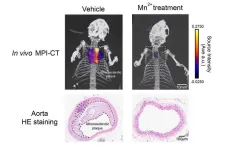(Press-News.org)
SINGAPORE – A large-scale international study spanning three continents, led by researchers from A*STAR’s Translational Neuroscience Programme of the Singapore Institute for Clinical Sciences (SICS) in Singapore, has found that maternal depressive symptoms begin from early pregnancy and can last up to two years after childbirth.
While health professionals often emphasise the postpartum stage after childbirth as a high-risk period for the onset of depression, findings from this latest study reveal a different reality – that maternal depressive symptoms can appear from early pregnancy and therefore timely interventions during pregnancy are needed to better mitigate such symptoms for improved outcomes for both mother and child.
Previous findings from the Growing Up in Singapore Towards healthy Outcomes (GUSTO) project showed clearly that prenatal maternal mental health plays a significant role in the brain development and health of one’s offspring. Research shows that maternal depressive symptoms can negatively affect a child’s nutrition, physical health, cognitive functions, socioemotional development, academic achievement, and also increase the risk of ADHD and depression.
The study was published in the journal JAMA Network Open on 26 Oct 2023, titled “Perinatal Trajectories of Maternal Depressive Symptoms in Prospective, Community-Based Cohorts Across 3 Continents”. It involved seven prospective observational cohorts across the United Kingdom, Canada, and Singapore. A*STAR researchers analysed the maternal depressive symptom trajectories of 11,563 pregnant women, spanning multiple decades in the largest such analysis to date.
Among the cohorts analysed were three from Singapore: Growing Up in Singapore Towards healthy Outcomes (GUSTO), Singapore PREconception Study of Long-Term Maternal and Child Outcomes (S-PRESTO) and Mapping Antenatal Maternal Stress (MAMS). Each cohort included depressive symptoms measured at multiple perinatal time points and analysed independently. The data was based on prospective maternal self-reports of depressive symptoms, eliminating the potential bias collected from retrospective reports.
The study showed three distinct clusters of mothers with stable low, mild, and high symptom levels over the perinatal period – the period from the beginning of pregnancy up to two years post-birth. The trajectories of depressive symptoms were present for all mothers. This was true even those who met clinical cut-offs for probable depression indicating that more serious instances of depression in women begin prior to the birth of the child.
With a more precise grasp of when depressive symptoms begin for mothers, the study underscores the importance of early interventions during pregnancy to mitigate maternal depressive symptoms and their impact on offspring. This paradigm shift has far-reaching implications for healthcare professionals, policymakers, and the general public.
“Several recent studies, including one conducted locally suggest that maternal depressive symptoms may begin before conception, which is why interventions, guidelines for care, and public health policies aimed at alleviating maternal depressive symptoms should target as early as preconception, at least during pregnancy, in addition to the postnatal period, for more effective outcomes,” says Dr Michelle Kee, Research Scientist at A*STAR’s SICS and first author of the paper.
Professor Michael Meaney, the Director of the Translational Neuroscience Programme at SICS, adds, “The medical media continues to refer to maternal depression as ‘postnatal depression’, implying that the onset of symptoms occurs following the birth of the child. This extensive analysis shows that the onset of symptoms is in the prenatal period and remains largely stable thereafter. This is true for women in the community as well as for those experiencing more severe symptom levels. The results of this study point to the early antenatal period as a crucial time point for the identification of stable trajectories of maternal depressive symptoms and emphasises the critical importance of prenatal intervention.”
Associate Professor Helen Chen, Senior Consultant Department of Psychological Medicine, KK Women's and Children's Hospital and Clinical Associate Professor of Duke-NUS Medical School shares, "This study provides strong evidence across populations that it is crucial to address depression during pregnancy so that mothers are well and ready to receive their babies, rather than to wait until the postnatal period, for postnatal depression has traditionally been the focus. Given what we know about the impact of perinatal depression on child development and health outcomes, the paper will help to inform healthcare systems to direct resources upstream to the antenatal period. This will benefit our mothers and their children, and population health of future generations."
END
According to a new paper in Oxford Open Climate Change, published by Oxford University Press, the strategies humanity must pursue to reduce climate change will have to include more than reducing greenhouse gases. This comes from an analysis of climate data led by researcher James Hansen.
Scientists have known since the 1800s that infrared-absorbing (greenhouse) gases warm the Earth’s surface and that the abundance of greenhouse gases changes naturally as well as from human actions. Roger Revelle, who was one of the early scientists to study global warming, wrote in 1965 that industrialization meant that human ...
Osaka, Japan – When you think of Japan in the age of COVID, you might imagine a crowd of people wearing masks. But why do so many Japanese people wear masks?
In an article published this month in the International Journal of Disaster Risk Reduction, a researcher from Osaka University analyzed mask use before and after the government of Japan downgraded the legal status of COVID-19. Results showed that many people continue to wear masks for socio-psychological reasons – including reasons related to ‘relief’ and ‘norm’.
Of course, the obvious motivation for mask use is disease prevention. In the first ...
Regular and moderate physical activity can significantly improve the quality of life of people with internal diseases such as cancer and depression. Unfortunately, many people with internal disorders cannot sufficiently participate in exercise training for several reasons. For example, they often do not have access to appropriate exercise training programs, have a high therapeutic burden, fatigue, or simply no time to engage in physical activity. Accordingly, the Sports Medicine research group led by Professor Perikles Simon at Johannes Gutenberg University Mainz (JGU) investigates how physical activity can be promoted and integrated into patients' daily lives by applying digital tools ...
Arlington, Va. — November 2, 2023 — A new study published today in the American Journal of Infection Control (AJIC) reveals that the use of doxycycline may help protect against Clostridioides difficile (C. diff) infection for some patients with pneumonia. Specifically, study authors found that for hospitalized patients with community-acquired pneumonia who had experienced C. diff infections in the prior year, the use of doxycycline, instead of the more commonly used azithromycin, reduced the development ...
Orlando, Fla - If you’ve ever seen a movie or TV show in which a character has a seizure, you probably have a fairly standard mental picture of someone falling to the ground in full body convulsions while foaming at the mouth. But that doesn’t necessarily reflect reality. A new national survey by Orlando Health finds that while most Americans recognize those classic symptoms of what’s called a generalized tonic-clonic seizure, the majority fail to recognize the subtle signs, all of which can be dangerous and have a profound ...
Cardiovascular diseases (CVDs) continue to rank as the top killer in the modern world. This deadly disorder often starts with the buildup of lipid deposits or plaques within the blood vessel, silently setting the stage for atherosclerosis. Rupture of these atherosclerotic plaques, however, could clot blood vessels and lead to life-threatening conditions including heart attack or stroke.
Dyslipidemia, meaning having too much “bad” or atherogenic lipids in the blood, represents the most common cause of CVDs and ...
A pioneering study led by Professor Ashok Venkitaraman from the Cancer Science Institute of Singapore (CSI Singapore) at the National University of Singapore and Dr Mona Shehata from the University of Cambridge (UK) has uncovered vital insights into the distinct effects of BRCA2 mutations on breast tissue cells, shedding light on early breast cancer development in people with BRCA2 mutations. The research was published in the prestigious journal Nature Communications on 25 August 2023.
Breast cancer is a serious concern for individuals with BRCA2 mutations, ...
A growing recognition of the health impact of social risks – such as food insecurity and homelessness – has prompted researchers, healthcare providers and policymakers to consider ways to address these risk factors as part of holistic clinical care. However, some healthcare providers worry the same interventions designed to help patients and families with social risks might also make them feel singled out or like they are otherwise stigmatized.
Now, new results of a rigorous study from the University of Chicago Medicine published October 2023 in JAMA Pediatrics suggest well-designed interventions that address social risks can be provided ...
University of Arizona Health Sciences researchers received a $13.1 million grant from the National Institute on Aging to continue studies aimed at rejuvenating the immune system of older people in order to improve health throughout the lifespan.
Older adults are disproportionally affected by infection, cancer and certain types of autoimmune disease. This is influenced by the fact that as a person ages, their body produces fewer T cells and gets less proficient at maintaining them. T cells are a type of white blood cell essential to the immune ...
Type 1 diabetes is an autoimmune disease that causes the body's immune system to attack and destroy insulin-producing beta cells in the pancreas. Traditional management of type 1 diabetes has primarily involved replacing the missing insulin with injections which, though effective, can be expensive and burdensome. A new study led by researchers at the University of Chicago Medicine and Indiana University suggests that an existing drug could be repurposed to treat type 1 diabetes, potentially reducing dependence on insulin as the sole treatment.
The research centers on a medication known as α-difluoromethylornithine (DFMO), which inhibits an enzyme that plays a key role in cellular ...



